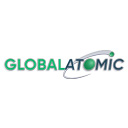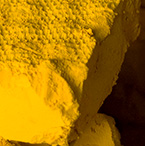Global Atomic - Dasa Project Continuing to Advance with Alternative Financing Disscussions Underway

Global Atomic continues advancing its flagship Dasa uranium project in Niger despite political uncertainty. With construction underway and economics improving, the company is assessing financing options and remains a unique uranium investment.
- Political situation in Niger has slowed financing and project development, but mining operations continue
- Estimated 6-12 month delay in yellowcake production to early 2026 due to financing issues
- Many groups interested in providing project financing, including off-take agreements and joint ventures
- Ore reserves and mine plan being updated, expect significant increase in NPV
- Company focused on moving project forward despite political uncertainty in Niger
About Global Atomic
Global Atomic is a Canadian-based resource company focused on advancing its flagship Dasa uranium project located in the Republic of Niger. With construction underway, Dasa is on track to become one of the world's largest and lowest cost uranium mines.
Global Atomic's operations also include a zinc recycling business located in Türkiye that provides cash flow to support development of the company's core uranium business.
Global Atomic holds interests in several uranium exploration permits in Niger covering over 250,000 hectares proximal to significant uranium deposits. In addition to its flagship Dasa mine, the company has discovered multiple exploration targets that provide significant upside potential beyond Dasa's initial mine life.
Interview with President & CEO, Stephen Roman
Navigating Political Uncertainty to Advance Niger Uranium Project
Global Atomic stands poised to become the next major producer of uranium just as demand is set to outstrip supply. However, recent political upheaval in Niger has disrupted financing plans, highlighting the risks of operating in the region. In this uncertain environment, Global Atomic remains committed to advancing its flagship Dasa Project while exploring alternative financing options.
On April 26th July 2023, military officers in Niger announced they had overthrown President Mohamed Bazoum in a coup d'état. The US State Department has now designated that a coup did occur, creating financing challenges for Global Atomic's Dasa uranium project.
Located in the Republic of Niger, Dasa is a world-class uranium deposit that is rapidly advancing to production. With all permits in place and site preparation and plant construction underway, Dasa was on track to begin producing yellowcake in early 2025. However, the coup has caused delays of 6-12 months, pushing production to early 2026.
Global Atomic President and CEO Stephen Roman provided perspective on how his company is navigating the political uncertainty in Niger. He emphasized that the coup has been peaceful so far, with mining operations continuing across the country. "The country, the junta, they need cash flow, they need revenue, they need jobs and so that’s what we’re providing," said Roman.
While the Dasa project itself remains on schedule, financing has hit roadblocks. International development banks active in Niger have put funding on hold until democratic elections are held. Despite this challenge, Roman stressed that Global Atomic has been approached by many groups interested in financing Dasa through vehicles like off-take agreements, joint ventures, prepayments, and trading houses.
"Rather than having yellow cake beginning of 2025 it’ll probably be beginning of 2026. I don’t think in the grand scheme of things that’s going to be a bad thing," stated Roman. "This has opened up the gate for many others to come in and talk to us. So this is very positive - we aren’t sitting here like a lame duck."
Advancing While Assessing Options
Global Atomic continues to advance engineering, procurement, and site preparation activities on the ground at Dasa. The company has stockpiled critical supplies and consumables using alternative logistics routes through Togo. Mining operations are scheduled to recommence within weeks.
At the same time, Global Atomic is assessing numerous financing options beyond traditional debt. This includes potential deals structured around offtake agreements, joint ventures, trading prepayments, and royalty vehicles. The company recently signed it's third LOI, a multi-year supply contract for future production, which could provide up to $250 million in funding. The two previous LOI's have already converted into supply agreements.
Roman emphasized Global Atomic's flexibility in pursuing alternatives that maximize shareholder value. "We're not bound by anything. We want to do what's best for the company and shareholders," he stated. The company is even considering invitations to discuss partnerships in China.
Long-Term Fundamentals Remain Strong
Amidst the political instability, Roman stressed that global uranium fundamentals are as robust as ever. This was evidenced by uranium spot prices rebounding back above $50/lb in September 2023 after dipping below $45/lb earlier in the summer. Several catalysts are expected to drive further price appreciation going forward.
On the demand side, nuclear power generation is expanding as more countries embrace it for carbon-free baseload electricity. China, India, and others have major reactor construction programs underway. And innovators are developing next generation nuclear technologies like small modular reactors (SMRs), which have the potential to significantly grow the addressable market.
Meanwhile, supply challenges persist in the uranium market. Years of low prices dis-incentivized investment in new mines. Existing producers have struggled with flooding, care and maintenance programs, and lack of capital to expand capacity. This has set the stage for annual supply deficits just as demand growth is accelerating.
World-Class Asset
Dasa represents one of the largest and highest grade undeveloped uranium deposits globally. The project has nearly 100 million pounds of proven and probable reserves grading over 5,000 ppm.
Based on a 2021 feasibility study, Dasa is expected to produce over 4.4 million pounds of yellowcake per year at all-in sustaining costs under $22/lb. This would position Dasa in the lowest quartile of the global uranium cost curve. The asset's significant production and low costs make it a strategic uranium project that can provide fuel to nuclear reactors as demand ramps up.
"There's going to be a significant increase based on the drilling we did and moving a lot of our inferred resources to measured and indicated, which are now being translated into an updated minable reserve," Roman explained. The company expects to announce these expanded reserves and an updated net present value in the near future. This has the potential to re-rate the value of the Dasa asset.
The Investment Thesis for Global Atomic
- World-class uranium asset capable of large-scale production by 2026
- Low all-in sustaining costs position Dasa in lowest quartile of global cost curve
- Additional exploration upside on top of 12-year initial reserve mine life
- Strong management team able to adapt to political uncertainty in Niger
- Demand growth from nuclear reactor construction coupled with supply deficits
- Uranium fundamentals indicate significantly higher prices likely
- Potential for high investment returns at current valuation
Global Atomic's Dasa Project provides a compelling opportunity for investors seeking uranium price leverage. Despite recent political instability, Dasa remains on track to come online by 2026 to meet rising uranium demand. The asset boasts exceptional size and grade, exploration upside, low costs, and experienced management. As uranium fundamentals strengthen over the coming years, Global Atomic appears poised to generate outstanding investment returns. Though risks exist related to Niger's political situation, the company is actively exploring ways to mitigate this to advance Dasa on schedule. Global Atomic warrants consideration.
Analyst's Notes




Subscribe to Our Channel
Stay Informed












































